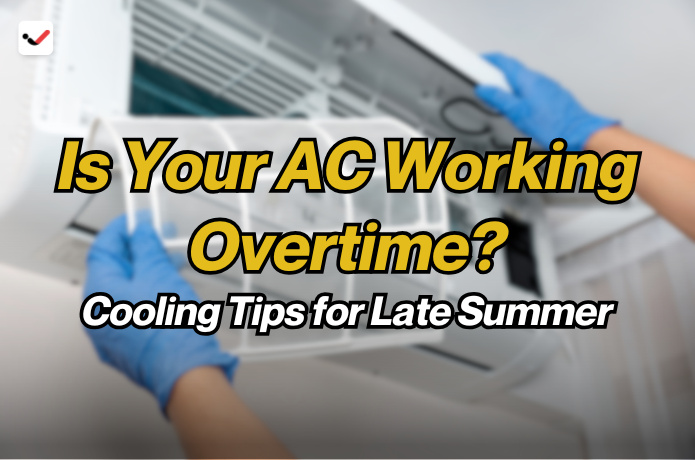Is Your AC Working Overtime? Cooling Tips for Late Summer
Is Your AC Working Overtime? Cooling Tips for Late Summer

As summer stretches into August and September, many homes start feeling hotter than ever. The sun is stronger, humidity is higher, and your air conditioner may be running almost nonstop. If your energy bill has gone up or your house still feels warm even with the AC on, your cooling system might be working harder than it should. This puts pressure on the unit, wastes energy, and shortens its lifespan.
Late summer heat can take a toll on even the best air conditioning systems. But there are ways to reduce the load, keep your home cool, and lower your cooling costs. With some simple changes and smart habits, you can stay comfortable without pushing your AC to the limit. Here are practical cooling tips to help you beat the late summer heat and avoid overworking your air conditioner.
1. Close Curtains and Blinds During the Day
Sunlight coming through windows can quickly heat up your home. Keeping blinds, curtains, or shades closed during peak sunlight hours can block a lot of that heat. Use blackout curtains or thermal shades for extra insulation. This reduces the amount of work your AC has to do and helps maintain a cooler indoor temperature.
If possible, open the windows at night when the air is cooler and close them early in the morning. This helps remove trapped heat and bring in fresh air without relying on your cooling system.
2. Seal Leaks and Insulate Properly
Cool air can escape through small cracks, gaps, and poorly sealed doors or windows. If warm air is getting in and cool air is leaking out, your AC has to run longer to maintain the set temperature. Use weatherstripping, caulk, or foam sealant around windows, doors, and vents to keep air from escaping.
Also, check your attic and walls for proper insulation. Good insulation helps keep your home cool in summer and warm in winter. It’s a long-term investment that improves energy efficiency and reduces HVAC system strain.
3. Use Ceiling Fans and Floor Fans
Ceiling fans don’t lower the temperature, but they help circulate air so rooms feel cooler. Use fans along with your AC to improve airflow and reduce hot spots. Make sure your ceiling fans spin counterclockwise in summer to push cool air down.
Portable floor fans or tower fans can also help move air around, especially in larger rooms. This takes some of the pressure off your central air conditioning and makes your home feel more comfortable.
4. Raise the Thermostat When You’re Away
One of the simplest ways to save energy is to increase the thermostat setting when you’re not home. Even raising it by 4–6 degrees while you're out during the day can make a big difference. Use a programmable thermostat or smart thermostat to automate this process.
When you’re home, try setting your thermostat to 75–78°F instead of the lower 70s. Every degree higher saves energy and reduces AC usage, especially during late summer when systems are already working harder.
5. Replace or Clean Air Filters
Dirty air filters block airflow, making your air conditioning unit work harder. Check your filters every month and replace or clean them as needed. For most homes, replacing filters every 1–2 months in the summer is ideal.
Clean filters also improve indoor air quality and help prevent dust and allergens from spreading through your home. This simple maintenance task can make a big impact on cooling efficiency.
6. Avoid Using Heat-Generating Appliances Midday
Appliances like ovens, stoves, dryers, and even dishwashers produce heat that can warm up your home fast. During the hottest part of the day, avoid using these if possible. Cook with a microwave, slow cooker, or grill outside instead of using the oven.
Do laundry and run the dishwasher in the early morning or late evening. Small changes like this reduce indoor heat and help your AC run less frequently.
7. Check the Outdoor Unit
Your outdoor AC unit, also called the condenser, needs clear space around it to work properly. Check that there are no leaves, dirt, or debris blocking airflow. Trim back plants or bushes at least 2 feet around the unit. If the coils are dirty, gently clean them with a hose or soft brush.
A clean and clear condenser works more efficiently, which means better cooling and less strain on your system.
8. Schedule Regular AC Maintenance
If your air conditioner is running longer than usual, it might need professional servicing. Late summer is a great time to schedule AC maintenance before even hotter days or unexpected breakdowns happen. HVAC technicians can check refrigerant levels, inspect the system, and make sure everything is working at peak efficiency.
Regular maintenance improves energy efficiency, prevents expensive repairs, and extends the life of your AC unit.
9. Upgrade to a High-Efficiency System
If your air conditioner is over 10–15 years old, it might be time for an upgrade. Modern energy-efficient air conditioners use less power and cool more effectively. Look for ENERGY STAR certified systems that meet high standards for cooling performance.
Though it’s a big upfront cost, a high-efficiency AC can save hundreds of dollars a year in energy bills, especially in hotter climates or areas with long summers.
10. Use a Dehumidifier
High humidity can make your home feel much warmer than it is. Even if the temperature is reasonable, too much moisture in the air makes it feel sticky and uncomfortable. Your AC does some dehumidifying, but in very humid areas, a dedicated dehumidifier can help a lot.
Reducing humidity means your home feels cooler, so you may not need to run the AC as much. It's another smart way to ease the load on your cooling system.
Keep Your Cool Without Overworking Your AC
By taking a few simple steps, you can reduce heat inside your home, improve air circulation, and give your AC a break. Whether it’s sealing up leaks, using fans, or just turning off the oven in the afternoon, small changes add up. Smart cooling habits not only help your home stay comfortable—they also lower your energy bill and extend the life of your HVAC system.
Late summer doesn’t have to mean higher costs and constant air conditioning. With these tips, you can stay cool and keep your system running efficiently, even on the hottest days.

